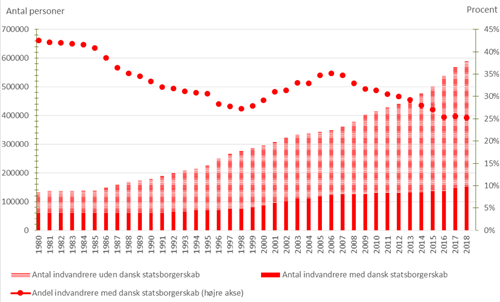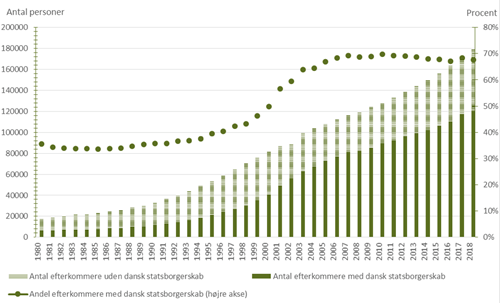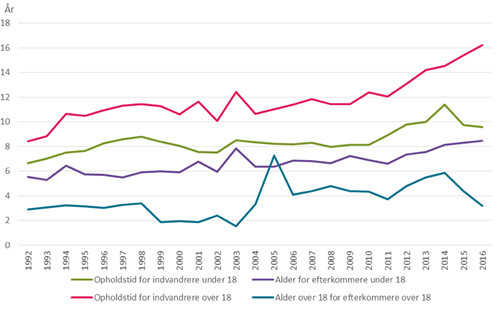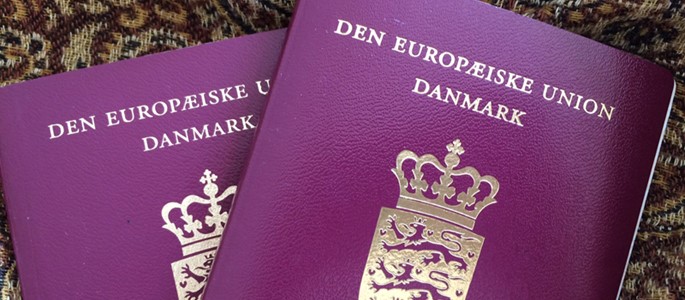Citizenship in Denmark
How do you acquire Danish citizenship, also called naturalisation?
Links to more information (in Danish only):
Danish Institute for Human Rights recommendations concerning citizenship
Danish Institute for Human Rights report "Fremmed i eget land" about children growing up in Denmark without citizenship
The association Fair Statsborgerskab helps applicants with many questions
Rules on acquisition of Danish citizenship are included in the Danish Constitution, the Act on Danish Citizenship and the latest circular on naturalisation.
Entitlement to Danish citizenship
According to the Danish citizenship act, a child is automatically a Danish citizen if born to a Danish parent (father, mother or co-mother).
In addition, the citizenship act provides for citizenship acquisition by adoption, legitimation (at the marriage of a child’s Danish father and alien mother) and declaration (Nordic and former Danish citizens).
Acquisition of citizenship through naturalisation
Naturalisation means the granting of citizenship to a foreigner after application, by a formal act. According to the Danish Constitution, foreigners can only be granted citizenship by the Danish legislature.
A majority among the political parties in the Danish Parliament (Folketinget) decide the naturalisation requirements by agreement. The current rules were made by the government Lars Løkke III with votes from Social Democrats, Danish People's Party. The agreement is published in the naturalisation circular from 2021.
The Ministry of Immigration and Integration handles applications for naturalisation. Subsequently, the ministry includes applicants who fulfil the circular’s naturalisation requirements – or who have been granted dispensation by the Naturalisation Committee – in a bill on naturalisation. When a naturalisation bill is adopted by Parliament and has entered into force, the applicants who are included in the act will receive a declaration they must sign under a local citizenship ceremony. By participating in the ceremony, signing the declaration on compliance with the Danish Constitution etc. and shaking hands with an official at the ceremony, they become Danish citizens, and can apply for Danish passport after this.
The naturalisation procedure is lengthy. The average time for the ministry’s handling of applications is usually around one and a half year. After this follows the legislative procedure in Parliament (bills are only presented twice a year) plus the time necessary for accomplishing the citizenship ceremony. Thus, two years or more may pass.
Since 2015, dual citizenship is accepted in Denmark.
Residence requirements
Normally, applicants for naturalisation must have held a permanent residence permit for at least 2 years by the end of the month when the bill is supposed to be passed.Recognized refugees or people with similar status or stateless persons are only recquired to have permanent residence for 1 year.
In itself, this requirement may be a bar to naturalisation as permanent residence permit has its own high requirements, among others full-time employment or self-employment in Denmark for at least 3 years and 6 months out of the last 4 years prior to the granting of the residence permit. Moreover, the general residence requirement for permanent residence is 8 years of lawful residence in Denmark – or, for foreigners who meet four supplementary integration criteria, 4 years. Read more here.
Applicants for naturalisation must also have a period of lawful residence in Denmark, as a rule for 9 consecutive years. For refugees and stateless persons, the required period is 8 years. Foreigners who are married to a Danish citizen may be naturalised after 6 years of lawful residency if the marriage has lasted and the spouse has been Danish for at least 3 years. After 2 years of marriage, the residence requirement is 7 years and after 1 year of marriage, the residence requirement is 8 years. Periods of up to 1 year of cohabitation before marriage are equalised with marriage. Notably, due to the general residence requirement of 8 years for getting a permanent residence permit, the possibility of getting faster access to citizenship through marriage may for most applicants become insignificant.
Additional naturalisation requirements
Apart from fulfilling the residence requirements, applicants for naturalisation must:
• sign a declaration of loyalty to Denmark and the Danish society, declaring that they obey Danish law, including the Danish Constitution, and respect fundamental Danish values and legal principles, including Danish democracy
• have a clean criminal record. A number of conditions will exclude an applicant from ever being naturalised: any prison sentence, conditional or non-conditional or permanent expulsion from Denmark. Fines above 3,000 DKK will result in waiting periods, for instance a fine of DKK 3,000 will postpone the naturalisation for 4.5 year)
• have no overdue debt to public authorities, including state study loans, fines or case expenses above 3,000 DKK. It is accepted if you have an installment plan that you adhere to.
• have been self-supporting for the last 5 years; this means that an applicant must not (with a few exceptions) have received social benefits under the act on active social policy or the integration act (aktivloven and integrationsloven) for more than 4 months out of the last 5 years and no such aid for the last 2 years. Moreover, if the applicant has received unemployment support for more than 4 months within the self-support periods, these periods will be prolonged correspondently. State study grant and pensions are not a hindrance.
• have been in ordinary full-time employment (min. 120 hours pr month) for at least 3.5 years or be self-employed to a similar degree and still be in occupation at the time when the bill is presented. Periods of parental leave and vacation can be included if during a period of occupation
• document Danish language skills by a certificate of the PD 3 exam (European level B2) or a similar exam, including the Danish 9th or 10th grade exams. For applicants who have been self-supporting for the last 9 year (applicants who have not received social benefits under the act on active social policy or the integration act within the last 9 years), passing the PD2 Exam (European level B 1) or a similar exam is sufficient
• document knowledge of Danish culture, history and society by passing the citizenship test of 2021 (tests from June 2016 and forward are accepted)
• participate in a municipal citizenship ceremony held after the adoption of the naturalisation bill and shake hands with an official.
Dispensation from the naturalisation requirements
In principle, the Naturalisation Committee may grant an applicant dispensation from any naturalisation requirement. However, the committee’s dispensation practice is very restrictive, and the amount of positive decisions has plummeted in recent years. In 2021, only 4 persons were granted a dispensation from the language and/or citizenship test due to sickness.
The naturalisation circular includes a provision on dispensation from the Danish language and knowledge requirements, based on the UN Convention on the Rights of Persons with Disabilities.
An application must document having participated as much as possible in the relevant courses and having attempted to pass the relevant language exam and the citizenship test. If the applicant has not managed to pass the recquired language exam, it must be documented that s/he has tried to learn Danish and pass a test at the highest level possible according to the disabilities. Medical statements must live up to special conditions, including an assessment of future prognosis and options of learning Danish on the long term. But there are expamples of rejections in spite a psychiatrist clearly stating that it would be hopeless or even harmful for the patient to try passing the exams.
Children’s acquisition of citizenship
As a rule, children cannot themselves apply for Danish citizenship. However, a child with residence rights in Denmark may acquire Danish citizenship by extension at the naturalisation of one of his or her parents (with parental rights over the child). This means in short, that if an adult applies for citizenship, said person’s children under the age of 18 may be comprised by the application. Consent from the other parent (if he or she shares the custody of the child) is required. If a child over the age of 15 years has – or is charged of having – committed a crime, the child may be excluded from the parent’s naturalisation.
Only in situations where a child’s parents cannot apply for naturalisation, for instance because they already are Danish citizens, the child can apply independently (as a target person). Read more here (only in Danish).
The significance of statelessness
The obligation to avoid statelessness is included in many international conventions. In particular, states are responsible for preventing statelessness from arising. Therefore, they must as a rule grant their citizenship to persons born on their territory who do not acquire at birth the citizenship of another state. In this connection, states may lay down a few conditions for the acquisition of their citizenship.
In relation to stateless immigrants and refugees, it is sufficient for the states to ensure facilitated acquisition of citizenship. Denmark has implemented this obligation to the minimum by only reducing the lengths of the required residence period from nine to 8 years. This slight facilitation applies to all stateless immigrants and refugees, including those who arrived in Denmark as minors.
Entitlement to citizenship for stateless persons born in Denmark
The naturalisation circular provides for entitlement to Danish citizenship for two groups of stateless persons born in Denmark:
1. A stateless child is entitled to Danish citizenship by application if the parnets apply for this before the child turns 18. The child must be lawfully residing in Denmark; this means that the child must be registered with a CPR number and an adress in the Folkeregister.
2. A young stateless person born in Denmark and aged 18-21 is entitled to Danish citizenship, provided that he or she:
• applies between the age of 18 and 21
• has continuously been stateless since birth
• has resided habitually in Denmark for 5 years immediately before submitting the application for citizenship or, alternatively, 8 years altogether
• is not found guilty of an offence against national security and not sentenced to imprisonment for 5 years or more.
Read more in the leaflet from DRC about citizenship for stateless children (in Danish).
Application form and fees
Applications for citizenship must be submitted to the Ministry of Immigration and Integration by the use of a digital application form and MitID. Residents who are exempted from using digital solutions can use a paper form.
On the page for application you will also find a list of documents that must be attached.
The application fee is 4,000 DKK. No fee is required from children. The fee is not returned if the application is considered but rejected. But no fee is charged if you hand in another application later.
Loss of Danish citizenship
The political parties behind the current rules have agreed that there is a need for increased attention at cases where citizenship may be acquired due to fraud. Therefore, two years after an applicant has acquired Danish citizenship, the authorities will systematically investigate whether a withdrawal procedure should be initiated based on concealment of crimes committed before the acquisition of citizenship. Thus, new citizens will receive a letter two years after being granted the citizenship, informing about the results of the investigations.
It is also possible to have a citizenship withdrawn due to certain actions, for instance it has happened to people fighting for or moving to ISIS controlled areas. However, it can only happen if the person has another citizenship or a good chance of getting one.
Some people have had a Danish citizenship since childhood by mistake, and actually never had it for real – in such cases, there are relaxed rules to get it back.
Family members to a person who acquires Danish citizenship can in fact lose their permit to stay in this context, for instance if they had a permit as accompanying spouse under SIRI's rules. In that case, an application for family reunification under the Danish rules must be made.
Postscript
The Danish naturalisation requirements are strict, and they have continuously been strengthened within the last years. Concurrently, the share of immigrants with Danish citizenship has decreased, see figure 1. Around 600,000 immigrants do not have Danish citizenship.
Statistical data show that in 2006, about 35 percent of the Danish immigrants were Danish citizens. In 2018, the share had decreased to about 25 percent, see figure 1.
Figure 1: Immigrants and citizenship

RED: Number of immigrants with Danish citizenship. LIGHT RED: Number of immigrants without Danish citizenship. RED DOTS: Share of immigrants with Danish citizenship
More descendants have become Danish citizens. However, since 2006, the share of descendants with Danish citizenship has stagnated with variations between 67-70 percent, see fig. 2:
Figure 2: Descendants and citizenship

GREEN: Number of descendants with Danish citizenship. LIGHT GREEN: Number of descendants without Danish citizenship. GREEN DOTS: Share of descendants with Danish citizenship.
In addition, the restrictions of the citizenship legislation may have contributed to the increase in the residence period that immigrants on average spend in Denmark before acquiring Danish citizenship. In 2004, immigrants spent on average about 11 years in Denmark before they acquired Danish citizenship. In 2021, the average residence period has increased to about 18 years.
Figure 3: Age and time in Denmark at acquisition of Danish citizenship

GREEN: Years in DK for immigrants under 18. RED: Years in DK for immigrants above 18. PURPLE: Age for descendants under 18. BLUE: Age above 18 for descendants above 18.


